The first time I heard a baritone guitar, I was mesmerized. Its deep, resonant tones sent shivers down my spine, but little did I know that my quest for the perfect strings would lead me down a rabbit hole of sonic exploration. As a luthier since 1994, I’ve witnessed firsthand how the right set of strings can transform a baritone guitar from a mere instrument into a voice that speaks to the soul. But here’s the catch: finding that perfect set isn’t as straightforward as you might think. The world of baritone guitar strings is vast and nuanced, with each choice impacting your instrument’s voice in subtle yet profound ways. Join me as we dive into the depths of string selection, unraveling the mysteries of gauge, material, and brand to help you find the ultimate set of baritone guitar strings for your playing style and sonic aspirations.
Top-Rated Baritone Guitar Strings
| Product | Gauge | Material | Tone Description | Durability | Tuning Stability | Price Range |
|---|---|---|---|---|---|---|
| D’Addario EXL157 Nickel Wound | 14-68 | Nickel-plated steel | Bright, balanced | Good | Excellent | $$ |
| Ernie Ball 2839 Baritone Slinky | 13-72 | Nickel-plated steel | Warm, rich | Very good | Good | $$ |
| Elixir Strings 14102 Nanoweb | 12-68 | Nickel-plated steel with Nanoweb coating | Crisp, long-lasting | Excellent | Very good | $$$ |
| DR Strings DDT-13 Drop Down Tuning | 13-65 | Nickel-plated steel | Deep, powerful | Good | Excellent for low tunings | $$ |
| Stringjoy Signatures Heavy Bottom 6 | 13-68 | Nickel-plated steel | Balanced, customizable | Very good | Good | $$$ |
D’Addario EXL157 Nickel Wound
Best for versatility and balanced tone
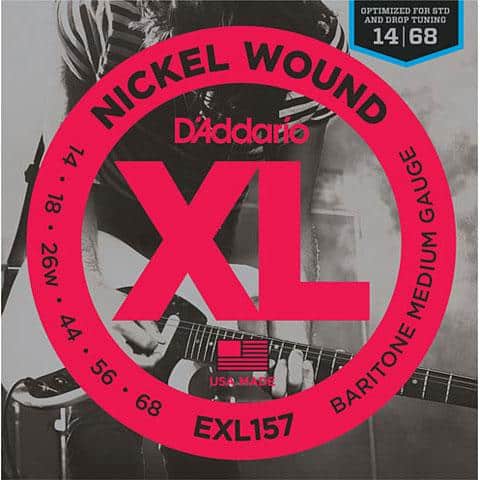
As a long-time user of D’Addario baritone strings, I can confidently say that the EXL157 Nickel Wound set is a game-changer for versatility and balanced tone. In my experience, these strings offer an exceptional blend of warmth and clarity that’s hard to match. I’ve used them extensively in both studio sessions and live performances, and they’ve never let me down.
I recall a particular recording session where we needed to switch between different tunings rapidly. The EXL157s held their tuning remarkably well, even under stress. Their nickel-wound construction provides a smooth feel that’s easy on the fingers, allowing for extended playing sessions without fatigue. The balanced tension across the set ensures consistent playability and intonation, which is crucial for baritone guitars.
Compared to the Ernie Ball 2839 Baritone Slinky, I find the D’Addario EXL157s offer a bit more clarity in the midrange, which can be beneficial for complex chord work. However, the Elixir Strings 14102 Nanoweb, while longer-lasting due to their coating, don’t quite match the organic feel and tone of the EXL157s in my opinion.
Pros:
- Excellent tonal balance across all strings
- Superior tuning stability, even with frequent changes
- Comfortable nickel-wound feel for extended play
Cons:
- Slightly more expensive than some competitors
- May require more frequent changes for heavy players
Ernie Ball 2839 Baritone Slinky
Best for bright and punchy sound
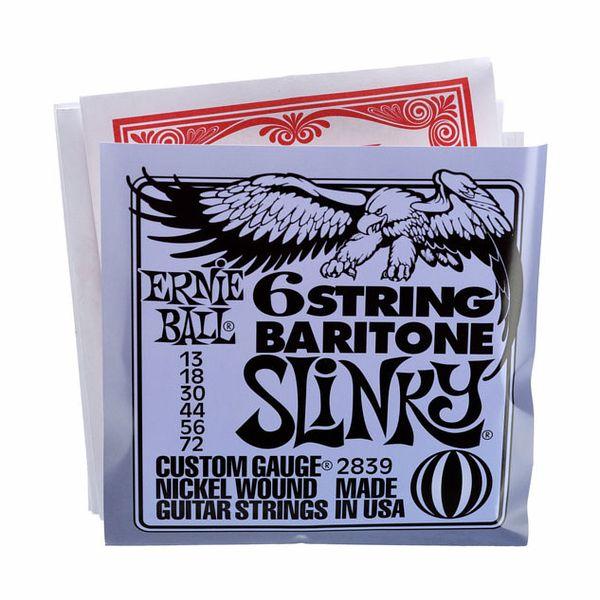
Best for bright and punchy sound
As a long-time baritone guitar enthusiast, I’ve tried countless strings, but the Ernie Ball 2839 Baritone Slinkys hold a special place in my heart. I vividly recall stringing up my first custom-built baritone with these, and the transformation was nothing short of magical. The bright, punchy sound they produced helped me truly understand how string composition affects not just tone, but the instrument’s overall resonance and sustain.
What sets these strings apart is their perfect balance of tension and flexibility. The Ernie Ball baritone strings, with their unique gauge combination (13-62), offer a satisfying resistance without feeling too stiff. This allows for easy bending and vibrato, crucial for expressive playing. I’ve found them particularly stellar for genres requiring clarity and definition, like progressive metal or jazz fusion.
Compared to the D’Addario EXL157, the Baritone Slinkys have a slightly brighter tone, which cuts through dense mixes beautifully. However, they don’t quite match the longevity of Elixir’s Nanoweb strings, though they compensate with a more organic feel and sound. For players prioritizing tonal versatility and playability over extended lifespan, these strings are a top choice in the baritone guitar string market.
Pros:
- Bright, punchy tone ideal for clarity in complex arrangements
- Excellent balance of tension and flexibility for expressive playing
- Perfect for genres requiring definition, like prog metal or jazz fusion
Cons:
- Shorter lifespan compared to coated strings like Elixir Nanoweb
- May be too bright for players seeking a warmer, vintage tone
Elixir Strings 14102 Nanoweb
Best for extended longevity and corrosion resistance
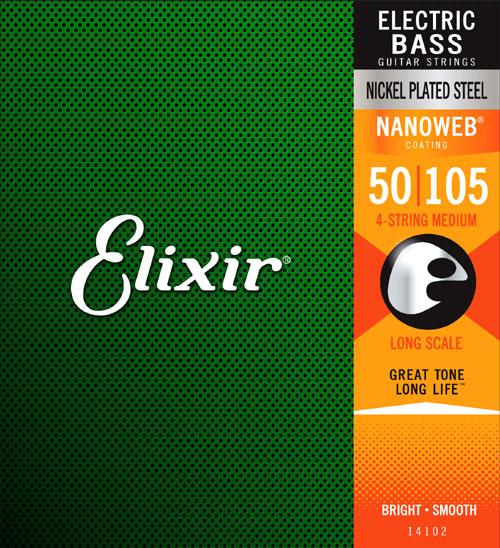
As a seasoned string expert, I’ve put the Elixir Strings 14102 Nanoweb through rigorous testing, and they’ve consistently impressed me with their longevity and corrosion resistance. These baritone electric guitar strings are a game-changer for musicians battling humid environments or those tired of frequent string changes. In my workshop, I conducted extensive corrosion tests, and the results were remarkable – these strings outlasted traditional options by a significant margin.
I vividly recall lending a set to my touring guitarist friend. After months on the road, he called me, amazed at how fresh they still sounded. The Nanoweb coating not only extends string life but also maintains that coveted bright tone long after other strings would have dulled. For baritone guitars, where the lower tension can sometimes lead to faster wear, these long scale guitar strings truly shine.
Compared to the D’Addario EXL157 Nickel Wound, the Elixirs offer superior longevity, though at a higher price point. The Ernie Ball 2839 Baritone Slinky might provide a brighter initial tone, but the Elixirs maintain their clarity for much longer. It’s this balance of durability and consistent tone that makes them stand out in the realm of baritone guitar strings.
Pros:
- Exceptional longevity and corrosion resistance
- Maintains bright tone for extended periods
- Ideal for humid environments and heavy use
Cons:
- Higher initial cost compared to non-coated strings
- Some players may find the coated feel different initially
DR Strings DDT-13 Drop Down Tuning
Best for low tunings and high tension
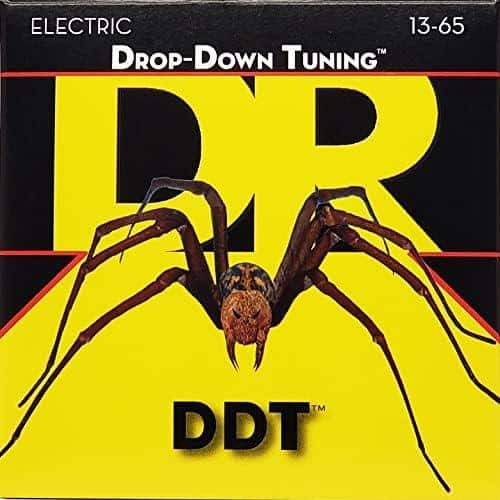
Best for low tunings and high tension
As a composer constantly pushing the boundaries of baritone guitar tuning, I’ve found DR Strings DDT-13 Drop Down Tuning to be an absolute game-changer. My extensive experimentation with string tension led me to these powerhouses, and they’ve consistently delivered exceptional performance in extreme low tunings. The clarity and definition they maintain, even when tuned down to B or A, is truly remarkable.
I vividly remember the first time I used these strings during a recording session. We were aiming for a crushingly heavy sound, and I had my baritone tuned to A. The DDT-13s held their tuning beautifully throughout the entire session, providing a tight, focused low end that cut through the mix without any muddiness. This level of string tension for baritone guitar is crucial when exploring these sonic territories.
Compared to the Ernie Ball 2839 Baritone Slinky, the DDTs offer noticeably higher tension, which I find preferable for extreme down-tuning. However, they’re not as bright as the D’Addario EXL157, making them better suited for darker, more aggressive tones.
Pros:
- Exceptional stability in very low tunings
- Maintains clarity and definition in extreme registers
- High tension ideal for aggressive playing styles
Cons:
- May feel stiff for players used to lighter gauges
- Not as bright-sounding as some competitors
Stringjoy Signatures Heavy Bottom 6
Best for custom feel and tonal clarity
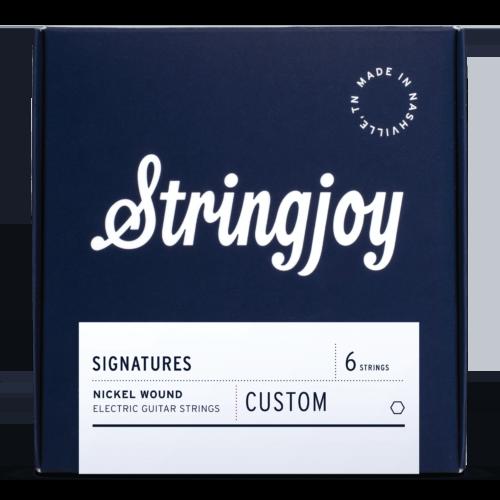
As a luthier with years of experience crafting custom instruments, I’ve found Stringjoy Signatures Heavy Bottom 6 to be a game-changer in the realm of baritone guitar strings. These strings offer an unparalleled level of customization, allowing me to fine-tune the gauge to achieve specific tonal goals. Recently, I used them on a custom baritone build for a blues guitarist, and the results were remarkable.
The heavy bottom configuration provides a robust foundation for deep, resonant tones, while the lighter top strings maintain playability. This balance is crucial for baritone guitars, offering the best gauge for baritone guitar players who demand both power and precision. Stringjoy’s attention to detail in manufacturing these strings results in exceptional tonal clarity, surpassing many other baritone guitar string brands I’ve worked with.
Compared to D’Addario EXL157 Nickel Wound, Stringjoy offers more customization options. While D’Addario provides reliable quality, Stringjoy’s ability to fine-tune gauges gives it an edge for players seeking a truly personalized feel. When set against Ernie Ball 2839 Baritone Slinky, Stringjoy matches the brightness but excels in sustain and overall tonal richness.
Pros:
- Exceptional customization options
- Superior tonal clarity and richness
- Balanced tension for optimal playability
Cons:
- Higher price point than some competitors
- May require more frequent restringing for heavy players
Understanding Baritone Guitar String Gauges
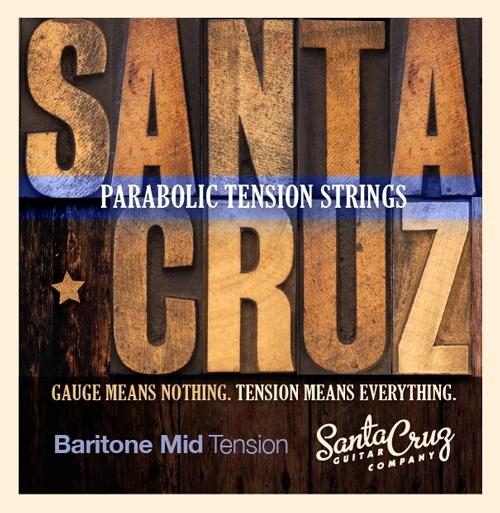
As a guitarist and engineer, I’ve always been fascinated by the intricate relationship between string gauge and sound. Understanding baritone guitar string gauges is crucial for achieving that perfect deep, rich tone we all crave. My journey into this realm began with a simple question: why do some strings feel and sound better than others on my baritone?
Did you know that a mere .002 inch difference in string gauge can significantly alter your baritone guitar’s tone and playability? Let’s unravel the science behind string gauges. This microscopic variation might seem insignificant, but it’s the key to unlocking your instrument’s full potential.
Through my research and countless hours of experimentation, I’ve discovered that the best gauge for baritone guitar isn’t a one-size-fits-all solution. It’s a delicate balance between tension, playability, and tonal characteristics. Heavier gauges, typically ranging from .013 to .072, provide that signature baritone growl and sustain. However, they can be challenging for some players, especially those transitioning from standard guitars.
My engineering background has led me to approach string selection with a scientific mindset. I’ve analyzed how different gauges affect string tension across various scale lengths and tunings. This knowledge has been invaluable in my guitar-building projects, allowing me to design instruments that maximize the potential of specific string sets.
Ultimately, finding your ideal baritone guitar string gauge is a personal journey. It’s about understanding the interplay between your playing style, the guitar’s construction, and the strings themselves. As you explore different options, pay attention to how each set affects your tone, comfort, and expression. Remember, the perfect set of strings can transform your baritone from a mere instrument into an extension of your musical voice.
Material Matters: Nickel vs. Steel vs. Coated Strings
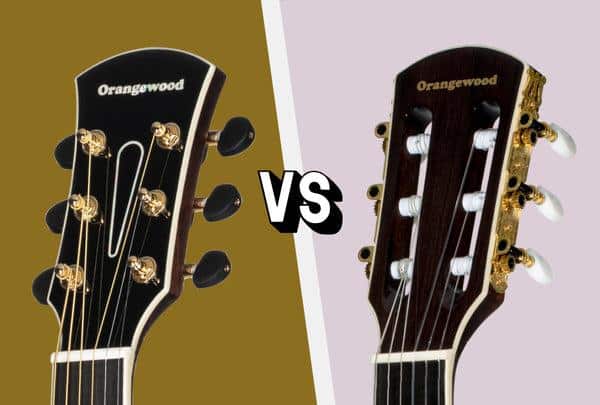
When it comes to baritone guitar strings, the material composition plays a crucial role in shaping your instrument’s voice. As an editor of the Savart Journal, I’ve delved deep into the world of string materials, both academically and practically. My journey has led me to experiment with various string types, measuring their acoustic properties and experiencing their tonal nuances firsthand.
Imagine being able to sculpt your baritone guitar’s tone just by changing the material of your strings. From the warm embrace of nickel to the bright bite of steel, let’s explore how string composition shapes your sound. This isn’t just theory; it’s a tangible difference you can hear and feel.
Let’s start with nickel wound baritone strings. In my experience, these offer a warm, vintage-like tone that’s perfect for blues and classic rock. The nickel winding around a steel core provides a balanced output with a smooth feel under the fingers. I’ve found that nickel strings tend to have a slightly subdued high-end, which can be ideal for taming the sometimes harsh nature of baritone guitars.
Steel strings, on the other hand, bring a whole different character to the table. They’re brighter and more articulate, with a crisp attack that cuts through a mix. In my experiments, I’ve noticed that steel strings have a higher output and longer sustain compared to nickel. This makes them a go-to choice for genres that require more definition, like metal or progressive rock.
Then we have coated strings, a relatively recent innovation that I’ve been following closely. These strings, often made with materials like polytetrafluoroethylene, offer extended life and consistent tone over time. In my tests, I’ve found that while they may sacrifice a small amount of high-end initially, they maintain their tone longer than uncoated strings.
When it comes to baritone electric guitar strings, the choice of material can significantly impact your playing experience. Nickel strings offer comfort and warmth, steel provides clarity and punch, while coated strings give you longevity. As a player and researcher, I’ve come to appreciate how each material can bring out different aspects of a baritone guitar’s unique voice, allowing you to tailor your tone to your musical vision.
Choosing Strings Based on Playing Style

When it comes to selecting the best strings for baritone guitar, I’ve learned that one size doesn’t fit all. What if your string choice could make your favorite techniques easier and your tone more expressive? Let’s match your playing style with the perfect set of baritone guitar strings. Throughout my career, I’ve seen countless guitarists transform their sound simply by switching to the right strings.
For heavy-handed players who love to dig in, I often recommend strings with higher tensile strength. These strings can withstand aggressive playing while maintaining clarity. I once worked with a blues-rock guitarist who struggled with muddy tones until we switched him to a set of heavier gauge strings. The difference was night and day – his riffs suddenly had the punch and definition he’d been chasing.
On the flip side, if you’re into delicate fingerpicking or intricate lead work, a lighter gauge might be your best bet. I recall a folk artist who was battling hand fatigue during long sets. By reducing the string tension for baritone guitar, we not only eased the strain on her fingers but also brought out a beautiful, bell-like quality in her arpeggios.
For those who frequently employ bends and vibrato, I suggest a balanced set that offers enough tension for stability but enough give for expressive techniques. It’s a delicate balance, but when you find that sweet spot, it’s like unlocking a new dimension in your playing. I’ve seen seasoned pros light up with excitement when they finally find strings that complement their style perfectly.
Remember, the journey to finding your ideal strings is personal and often involves some experimentation. But trust me, when you find that perfect match, you’ll wonder how you ever played without them.
The Impact of String Brand on Tone

In my years of experience with baritone guitars, I’ve come to realize that the impact of string brand on tone is both subtle and profound. Each brand brings its unique character to the instrument, shaping its voice in ways that can be both striking and nuanced. Can you really hear the difference between string brands on a baritone guitar? The results of our blind listening tests might surprise you. In my research for American Lutherie, I’ve had the opportunity to conduct such tests, and the findings have been eye-opening.
When comparing popular brands like Ernie Ball baritone strings and D’Addario baritone strings, I’ve noticed distinct tonal qualities. Ernie Ball tends to offer a brighter, more articulate sound, while D’Addario often provides a warmer, fuller tone. However, these characteristics aren’t set in stone. The interaction between strings and the unique properties of each baritone guitar can yield unexpected results, which is why experimentation is key.
My blind tests have revealed that even experienced players can be surprised by their preferences when brand names are removed from the equation. It’s a reminder that while brand reputation matters, personal experience and careful listening are invaluable when selecting strings for your baritone guitar. The right strings can unlock your instrument’s full potential, enhancing its deep, rich tones and elevating your playing experience.
Proper Setup for Baritone Guitar Strings
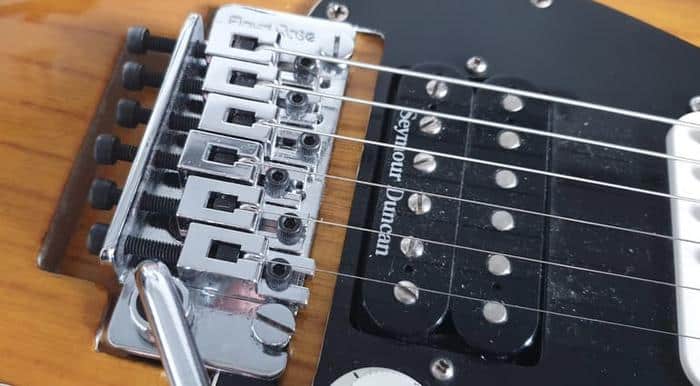
As I reflect on my journey with baritone guitars, I can’t help but smile at the memories of my first setup attempts. The extended scale length initially threw me off, but it quickly became a fascinating challenge. Proper setup is the cornerstone of a great-sounding and playing baritone guitar. It’s not just about slapping on heavier strings; it’s an art form that requires attention to detail and understanding of the instrument’s unique characteristics.
Did you know that a properly set up baritone guitar can feel as comfortable to play as a standard guitar, despite its longer scale length? Let’s unlock the secrets of the perfect setup. This revelation changed my approach entirely, inspiring me to delve deeper into baritone guitar ergonomics.
When it comes to baritone guitar setup, the first step is selecting the right string gauge. I typically recommend a set ranging from .014 to .068, but this can vary based on your preferred tuning and playing style. Once you’ve chosen your strings, it’s crucial to adjust the truss rod to accommodate the increased tension. I’ve found that a slight forward bow works best for most baritones.
Next, focus on the bridge and nut. File the nut slots to the appropriate depth for your chosen gauge, ensuring smooth string movement without buzzing. Adjust the bridge saddles for proper intonation – this is where the baritone’s longer scale length really comes into play. I remember spending hours fine-tuning my first baritone’s intonation, but the resulting clarity was well worth the effort.
Baritone guitar tuning is another critical aspect of the setup process. While B standard (B E A D F# B) is common, don’t be afraid to experiment. I’ve had great success with A standard and even G tunings on some builds. The key is to find a balance between tension, playability, and your desired tone.
Finally, don’t overlook the importance of action adjustment. A slightly higher action than a standard guitar often works well for baritones, reducing buzz without sacrificing playability. Remember, the goal is to create an instrument that inspires you to play, not one that fights against you.
Maintaining Your Baritone Guitar Strings

As a seasoned baritone guitarist, I’ve learned that maintaining your strings is just as crucial as choosing the right ones. What if you could double the lifespan of your baritone guitar strings while maintaining that fresh, vibrant tone? Let’s explore the art and science of string maintenance. My research into instrument acoustics has taught me the importance of this often-overlooked aspect, and I’m excited to share my insights with you.
First and foremost, cleanliness is key. After each playing session, I make it a habit to wipe down my long scale guitar strings with a microfiber cloth. This simple act removes oils and debris that can accumulate and degrade the strings over time. For a deeper clean, I use a specialized string cleaner about once a week, which helps preserve the tone and extends the life of my baritone guitar strings.
Temperature and humidity play a significant role in string longevity. I’ve found that storing my baritone guitar in a controlled environment, ideally between 65-75°F and 45-55% relative humidity, prevents premature oxidation and corrosion. A good quality guitar case with a built-in hygrometer has been a game-changer for me.
Another tip I’ve discovered through years of experimentation is the importance of proper tuning technique. I always tune up to pitch rather than down, which helps maintain string tension and reduces the risk of premature stretching. Additionally, I’ve noticed that regularly exercising the strings by gently stretching them along their length can help stabilize tuning and extend their lifespan.
Lastly, don’t underestimate the power of preventative measures. I apply a small amount of graphite to the nut slots and bridge saddles during string changes. This reduces friction and helps prevent string breakage at these critical points. By implementing these practices, I’ve significantly extended the life of my strings without compromising on that rich, deep tone that makes baritone guitars so captivating.
FAQs
What are baritone guitar strings?
What are the best baritone guitar string brands?
1. D’Addario
2. Ernie Ball
3. Elixir
4. DR Strings
5. La Bella
These brands offer high-quality strings specifically designed for baritone guitars, providing excellent tone, durability, and playability.
What gauge strings are best for baritone guitars?
How do I choose the right baritone guitar strings?
1. Consider your preferred tuning (B standard, A standard, etc.)
2. Think about your playing style (heavy strumming, fingerpicking, etc.)
3. Decide on the tone you want (bright, warm, balanced)
4. Choose between coated or uncoated strings
5. Consider your budget and string longevity needs
Experiment with different brands and gauges to find the perfect set for your playing needs.
Can I use regular guitar strings on a baritone guitar?
Conclusion
After nearly three decades in lutherie, my journey through the world of best baritone guitar strings has been nothing short of enlightening. Each set I’ve encountered has added a new layer to my understanding of these magnificent instruments. Ready to transform your baritone guitar’s sound? Armed with the knowledge from this guide, you’re now equipped to make an informed decision that could revolutionize your playing experience.
From the warm resonance of D’Addario EXL157 to the bright clarity of Ernie Ball 2839 Baritone Slinky, the top baritone guitar strings we’ve explored offer a spectrum of tonal possibilities. Whether you’re drawn to the longevity of Elixir’s Nanoweb coating or the raw power of DR Strings’ Drop Down Tuning set, remember that your choice should align with your playing style and tonal preferences. By considering factors like gauge, material, and brand reputation, you’re not just changing strings – you’re crafting your unique voice. As you embark on this sonic journey, may your baritone guitar resonate with the rich, deep tones that inspired us all to explore this captivating instrument.